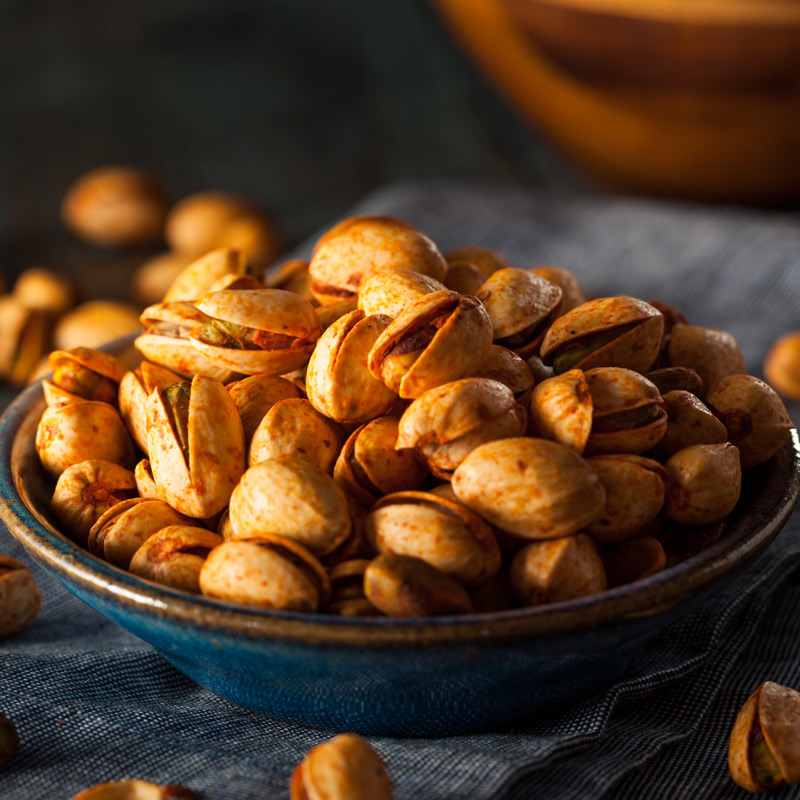
100 gr |
-- |
|
|---|---|---|
| Carbohydrate (gr) | 15.04 |
4928.47 |
| Protein (gr) | 3.59 |
1176.23 |
| Fat (gr) | 12.46 |
4083.43 |
| Fiber (gr) | 1.36 |
445.97 |
| Cholesterol (mg) | 14.64 |
4795.8 |
| Sodium (mg) | 325.27 |
106557.75 |
| Potassium (mg) | 392.16 |
128471.4 |
| Calcium (mg) | 78.15 |
25603.27 |
| Vitamin A (mg) | 46.04 |
15084.01 |
| Vitamin C (mg) | 6.16 |
2019.31 |
| Iron | 0.62 |
203.1 |
Pistachios are packed with protein, healthy fats, vitamins A and B, potassium, phosphorus, minerals, and fiber. Known for their role in supporting heart health and regulating blood sugar, they provide numerous benefits when included in a balanced diet.
Calories in Salted pistachios are 569 calories per 100 grams.
Supports Heart Health: A study published in the American Journal of Clinical Nutrition highlighted the cholesterol-lowering effects of pistachios. Researchers examined 28 adults with high LDL cholesterol levels. They tested three diets: one low-fat diet without pistachios, one healthy diet with a single serving of pistachios, and another with two servings. Results showed that LDL levels dropped significantly in those who consumed pistachios, indicating their potential in reducing bad cholesterol.
Improves Eye Health: Pistachios contain lutein and zeaxanthin, two carotenoids essential for eye health, particularly in preventing conditions like cataracts and macular degeneration. Since pistachios are rich in healthy fats, they help the body absorb these carotenoids more effectively, making them beneficial for maintaining good vision as we age.
Weight Management: Despite their calorie content, pistachios can help with weight management. They are rich in healthy fats, fiber, and protein, all of which promote a feeling of fullness, reducing the temptation to overeat. A study from UCLA’s School of Medicine found that people who replaced unhealthy snacks with pistachios didn’t gain weight, even when pistachios made up 20% of their daily calorie intake.
Enhances Male Sexual Health: Research conducted in Turkey in 2011 found that pistachios may improve erectile dysfunction (ED). In the study, married men with ED consumed 100 grams of pistachios daily for three weeks, representing 20% of their daily calories. These men reported significant improvements in their sexual health, likely due to the high levels of arginine, an amino acid that boosts blood flow by increasing nitric oxide production.
Supports Diabetes Management: A 2015 study from Penn State University examined the effects of daily pistachio consumption on lipid ratios, blood sugar control, and inflammation in adults with type 2 diabetes. While pistachios didn’t directly affect blood sugar, they improved cholesterol ratios and triglyceride levels. Since diabetes increases the risk of heart disease and stroke, regularly including pistachios in a healthy diet may reduce cardiovascular risks.
While pistachios offer numerous health benefits, excessive consumption can lead to negative effects. Pistachios, like other members of the Anacardiaceae family (such as cashews, mango, and poison ivy), contain urushiol, a compound that can cause allergic reactions and itching in some people.
Overeating pistachios, especially salted ones, may also result in weight gain, high blood pressure, and digestive issues. Salted pistachios, in particular, can increase sodium intake, leading to elevated blood pressure. Half a cup of salted pistachios can add 263 to 526 mg of sodium to your diet, raising blood pressure levels.
Pistachios are a nutrient-dense food that offers numerous health benefits, from supporting heart and eye health to aiding in weight management and improving sexual function. However, it is important to consume them in moderation, especially if they are salted, to avoid potential negative effects like high sodium intake. When eaten as part of a balanced diet, pistachios can contribute to overall health and well-being.